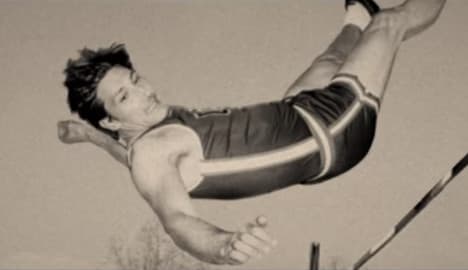Swedish DJ salutes jumper in inspiring video

The video for Swedish DJ Avicii's ‘Broken Arrows’ single tells the story of 1960s high jumper Dick Fosbury, whose “Fosbury Flop” technique revolutionised the sport and brought its inventor Olympic gold.
The video, directed by the Nigerian American filmmaker Julius Onah, has broken new ground for music videos by featuring an inspirational mini biopic.
The film starts with Fosbury living in a trailor park, drinking too much and struggling to fulfil his athletic potential.
It is only when his gymnast daughter realises that it would be possible to leap backwards, back arched, over the bar, that his life turns around.
The inspirational story has had 2.1m views on YouTube in less than one week, so it has clearly struck a nerve.
According to the specialist electronic music site YourEDM, the story is intended to parallel the way Avicii, whose real name is Tim Bergling, revolutionised dance music.
“As you watch the video, notice the family struggles and torn relationships centred around substance abuse that confront the main actor – something Avicii is all too familiar with,” journalist Daniel Cha wrote. “These are meant to mirror the struggles and emotions of Avicii and his team during their rise to the top.”
The real story of Dick Fosburg, according to online biographic accounts at least, is somewhat different.
He first developed the flop while still a fresh-faced high school student, and continued to refine it while at college until he won the US Olympic Trials with a jump of 2.16m.
After he took gold at the 1968 Olympics in Mexico City, the flop gradually became the most popular technique used by high jumpers.
In an interview with Olympics.org, the official news source of the Olympics Movement, last year Fosbury did however describe going through times when he felt like a failure.
“I was the worst high jumper on our team and on our league and I was very frustrated,” he said.
When he won the medal, his thoughts, he said, were of those who had supported him through the bad times.
“I was proud to be an American, but my main thoughts were of my home town, the people who had supported me even when I looked like I was failing. I think that’s something I will never forget.”
Comments
See Also
The video, directed by the Nigerian American filmmaker Julius Onah, has broken new ground for music videos by featuring an inspirational mini biopic.
The film starts with Fosbury living in a trailor park, drinking too much and struggling to fulfil his athletic potential.
It is only when his gymnast daughter realises that it would be possible to leap backwards, back arched, over the bar, that his life turns around.
The inspirational story has had 2.1m views on YouTube in less than one week, so it has clearly struck a nerve.
According to the specialist electronic music site YourEDM, the story is intended to parallel the way Avicii, whose real name is Tim Bergling, revolutionised dance music.
“As you watch the video, notice the family struggles and torn relationships centred around substance abuse that confront the main actor – something Avicii is all too familiar with,” journalist Daniel Cha wrote. “These are meant to mirror the struggles and emotions of Avicii and his team during their rise to the top.”
The real story of Dick Fosburg, according to online biographic accounts at least, is somewhat different.
He first developed the flop while still a fresh-faced high school student, and continued to refine it while at college until he won the US Olympic Trials with a jump of 2.16m.
After he took gold at the 1968 Olympics in Mexico City, the flop gradually became the most popular technique used by high jumpers.
In an interview with Olympics.org, the official news source of the Olympics Movement, last year Fosbury did however describe going through times when he felt like a failure.
“I was the worst high jumper on our team and on our league and I was very frustrated,” he said.
When he won the medal, his thoughts, he said, were of those who had supported him through the bad times.
“I was proud to be an American, but my main thoughts were of my home town, the people who had supported me even when I looked like I was failing. I think that’s something I will never forget.”
Join the conversation in our comments section below. Share your own views and experience and if you have a question or suggestion for our journalists then email us at [email protected].
Please keep comments civil, constructive and on topic – and make sure to read our terms of use before getting involved.
Please log in here to leave a comment.